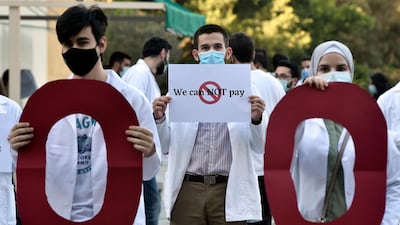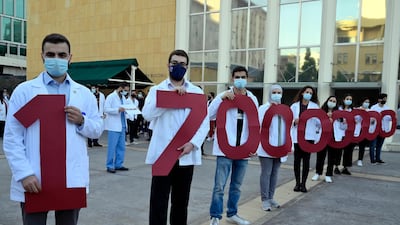Lebanese student leaders warned on Saturday that a recent hike in tuition fees at two leading Beirut universities constitutes a “declaration of war” against young people struggling to cope with an economic crisis and demanded involvement in decisions affecting their future.
“This is a declaration of war on 70 per cent of students who cannot afford the new fees,” said Jad El Hani of the American University in Beirut’s Secular Club at a press conference. “This is like telling young people: you have no right to learn.”
Young independents across Lebanon have presented a united front to defend their right to an education, which is becoming largely unaffordable in a country lauded for its quality of higher learning.
For the past 30 years, political life in the country's universities had been dominated by the same sectarian parties that have ruled the country since the end of the civil war, and are widely accused of corruption and mismanagement.
Yet independents won an unprecedented number of seats in student elections this year, a feat that would have been unimaginable before the nation-wide protests that broke out in October 2019.
They have organised protests on campuses throughout Lebanon against sudden hikes in tuition fees that could leave many students unable to continue their education in the Spring semester.
Two of Lebanon’s most well-known universities have announced changes that amount to more than doubling tuition fees. Others are expected to follow suit. This has angered students, many of whom are unable to pay the difference.
For the past year, a financial crisis triggered in part by a lack of foreign currencies has sent the lira into freefall. It is currently trading over 8,000 to the dollar on the black market, crushing the purchasing power of Lebanese people.
Last week, the American University in Beirut and the Lebanese-American University decided to price their tuition fees at a rate of 3,900 lira per dollar instead of the official peg of 1,500 lira.
AUB President Fadlo Khuri said the university had no other choice but to hike tuition fees to make up for the gap between its revenues in a depreciating Lebanese pound and its expenditures.
Independent student groups are demanding the government acts to prevent universities from increasing tuition fees without consulting students, a new contract between students and universities guaranteeing political freedoms, university elections and a cap on hikes in fees, and finally an overhaul of the Lebanese university, the country’s only public higher learning institution.

In the meantime, Mada Network, a youth political advocacy group, is supporting the creation of new independent groups on campuses as students heed their call for change and better representation.
Karim Safieddine of Mada Network says the sudden increase in fees is rejected by students.
“Why should we be the ones to pay the price of the economic crisis just like we paid the price when the same political class stayed in power after the civil war?” Mr Safieddine told the press on Saturday, adding that the protest movement that started in October 2019 had emboldened them to stand up for themselves.
“We decided not to pay the price any more. We will no longer be victims after October 17.”
Beirut is considered a beacon for higher education in the Middle East, its universities attracting the brightest minds in the region and exporting talent worldwide.
Over the years, the chances of finding employment in Lebanon after graduating have dwindled as a sluggish economy forced young people to seek opportunities abroad.
But young Lebanese now envisage a future in their home country.
“October 17 has changed the lives of all Lebanese, but especially students. We were expecting to graduate and leave the country. Now we have hope for Lebanon again. It was life-changing,” Marita Matar, a member of the newly formed USEK Independents, said.
She spoke of a taboo surrounding politics in universities. Politics is often associated with conflict and sectarianism by an older generation of Lebanese who lived through the civil war. This has kept younger people from engaging in political life for a long time. But now, they are reclaiming their right to be heard inside and outside university.
Resigned independent MP Paula Yacoubian, who was briefly present at the event, said this was the beginning of a wider change in Lebanese politics.
“They are the generation of true change. I have no doubt that the shift we are seeing today in student elections will be reflected in parliamentary and union elections,” Ms Yacoubian said.
Student representatives said it was necessary to lower the voting age from 21 to 18 to reflect this political awakening before the 2022 scheduled parliamentary elections.
“Our work starts in university but it does not stop there. After we graduate, our goal is to give people hope in parliamentary and union elections,” Ms Matar said.
“We want to show students that there is an alternative and this alternative is us.”








